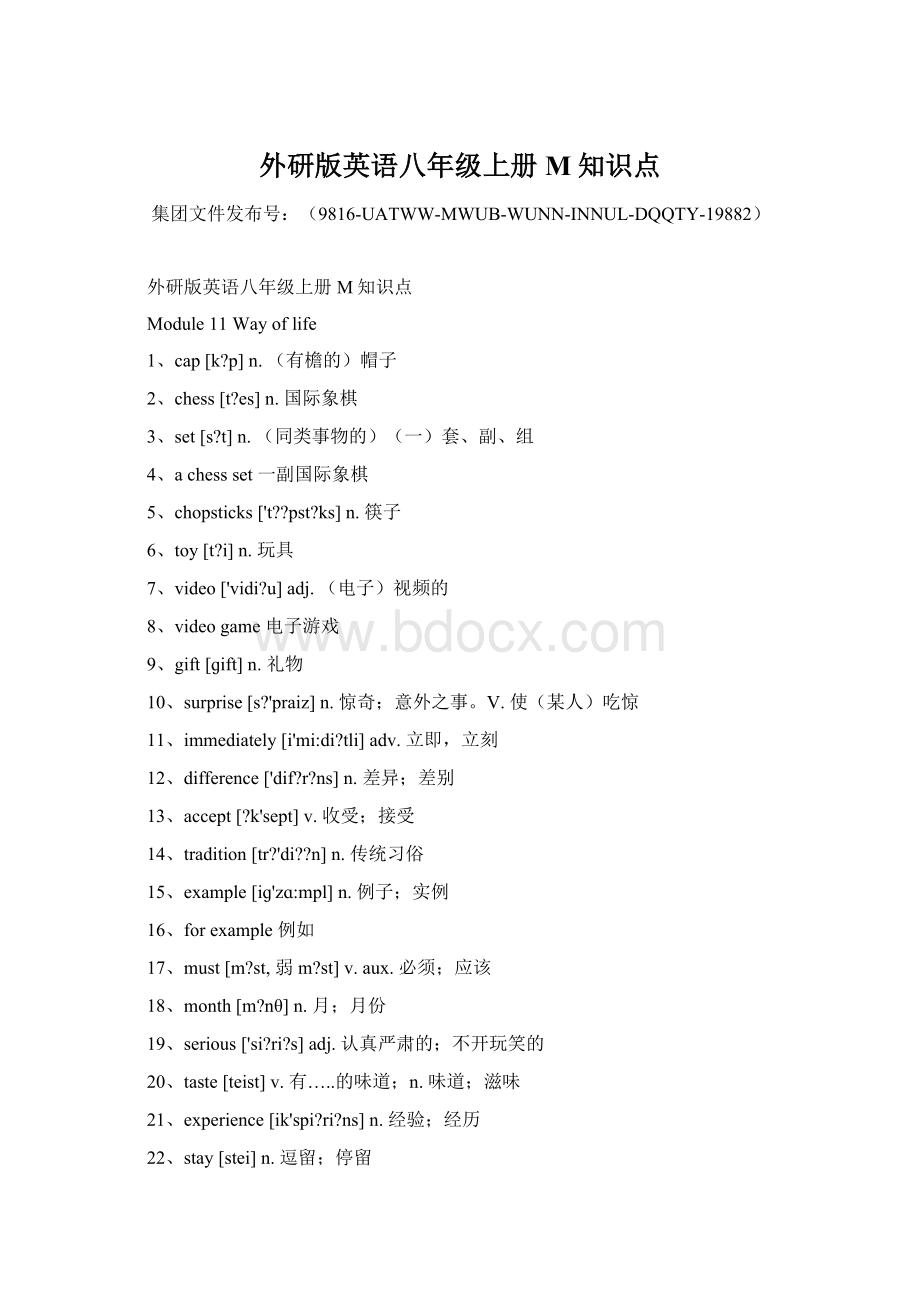外研版英语八年级上册M知识点Word文件下载.docx
《外研版英语八年级上册M知识点Word文件下载.docx》由会员分享,可在线阅读,更多相关《外研版英语八年级上册M知识点Word文件下载.docx(14页珍藏版)》请在冰豆网上搜索。

差别
13、accept[?
k'
sept]v.收受;
接受
14、tradition[tr?
n]n.传统习俗
15、example[iɡ'
zɑ:
mpl]n.例子;
实例
16、forexample例如
17、must[m?
st,弱m?
st]v.aux.必须;
应该
18、month[m?
nθ]n.月;
月份
19、serious['
si?
ri?
s]adj.认真严肃的;
不开玩笑的
20、taste[teist]v.有…..的味道;
n.味道;
滋味
21、experience[ik'
spi?
ns]n.经验;
经历
22、stay[stei]n.逗留;
停留
23、someone['
s?
mw?
n]pron.某人;
有人
24、forthefirsttime首次;
初次
25、sandwich['
nwid?
]n.三明治;
夹心面包
26、chip[t?
ip]n.炸土豆条;
炸薯条
27、fishandchips炸鱼加炸薯条
28、onto['
ntu]prep.在…之上;
向……之上
29、gentleman['
d?
entlm?
n]n.先生;
男士
30、shoulder['
uld?
]n.肩,肩膀
一、重点短语:
1.achessset一副国际象棋
2.videogame电子游戏
3.dosomecleaning打扫卫生
4.badluck倒霉
5.theSpringFestival春节
6.getmarried结婚
7.forexample例如
8.forthefirsttime首次;
9.shakehands握手
10.haveafternoontea喝下午茶
11.lightmeal便餐;
便饭
12.bedifferentfrom与……不同
13.eachother互相
14.ontime准时;
按时*intime及时,适时
15.lookup查寻*lookforward(to)/(todoing)sth期待,盼望
16.attheageof在……岁时
17.cleanup打扫干净
18.washup洗刷;
饭后洗餐具
19.stayout待在户外;
不回家
20.can'
twaitto迫不及待
21.makemistakes犯错;
出错
二、重点句型:
1.Hereisyourgift.这是你的礼物
*这是一句由here引导的倒装句,即here+谓语+主语,此外there也有这样的用法。
Eg:
Therecomesthebus.
*注意:
只有当主语是普通名词时才能够用倒装句,如果是代词则不能。
Hereyouare.
2.Whatasurprise!
真惊讶啊!
toone’ssurprise令sb惊奇的是
*此句是感叹句,用来表达赞美、惊叹、喜悦等感情,同样用how也可引导感叹句。
what+(a\an)+adj.+n.(+主语+谓语)!
Eg:
Whatabeautifulgirlsheis!
how+adj.\adv.(+主语+谓语)!
Howbeautifulthegirlis!
3.Youneedn’twait.你不必等了。
*need在这里用作情态动词,表示“需要”,常用于否定句、疑问句;
也用于must引导的一般疑问句的否定回答(needn’t),其后用动词原形。
needn’t=don’thaveto不必做
Eg:
Youneedn’tcometoschoolthisafternoon.
---MustIfinishmyhomeworktoday---No,youneedn’t.
*need作实义动词时,表示需要做某事。
当句子主语是人时,用needtodosth某人需要做某事
Ineedtotakesomeexerciseeverymorning.
当句子主语是物时,用needdoingsth某物需要被….这里,主动表被动,特殊用法
Ourclassroomneedscleaningeveryday.
4.difference(n.)不同之处,区别→different(adj.)不同的
bedifferentfromAisdefferentfromB.A与B不同
5.payattentionto(doing)sth注意做某事;
重视做某事;
关心,留意
6.accept(主观意识)接受receive(客观意识)收到,得到
Shereceivedapresent,butshedidn’tacceptit.
7.dosomecleaning打扫卫生
*这是一个由do+some+doing构成的短语)
Youshouldhelpyourmotherdosomecleaningafterschool.
*dosomewashing\cooking\shopping\sewing
8.hadbetter(not)dosth最好(不)做sth
Wehadbettertakeanumbrella.
Eg:
You’dbetternotgooutintheevening.
9.experience(n.)经历(可数名词);
经验、体验(不可数名词)
10.enjoydoingsth喜欢做某事
Mikeenjoyswatchingfootballmatches.
enjoyoneself=haveagood\nicetime玩的高兴;
过的愉快
11.somethinginteresting有趣的事
*当adj.碰到不定代词时,应把adj.放在后面something+adj.
Eg:
Canyoutellsomethingdifferentbetweenthetwopictures
Eg.Somethingdelicious
12.gettoknow了解,认识
DoyougettoknowmyfriendBill
13.not……but……不是……而是……(but表示转折)
Shewantstobuynotaskirt,butadress.
*notonly……but(also)……不但……而且……(表示递进)
HecanspeaknotChinesebutalsoEnglish.
14.traditional(adj.)传统的→tradition(n.)传统
15.takeaway拿走,带走(代词只能放在中间,名词放中间和后面均可)
takeitaway=takethepenaway=takeawaythepen
16.
(1)stopv.停止
*stoptodosth停下来去做某事Eg.Youshouldstoptodoyourhomework
stopdoingsth停下来正在做的事情Eg.Youshouldstopshoutingatclassroom.
(2)stopn.停止;
车站
*busstop停靠站
17.
(1)turnv.转(弯);
变得
*turnleftturngreen
(2)turnn.顺序
Eg.Itisyourturn.
18.ataageof=whensbis……yearsold.在……岁时
19.
(1)stayout不回家;
待在外面
Yesterdayhestayedoutafter12o’clock.
(2)stayathome呆在家里
Eg.It’srainyday,let’sstayathome.
(3)stayup熬夜
Eg.We’dbetternotstayup,itisbadforourhealth.
20.back-to-front前后颠倒,穿反了
Eg.Heputhissweateronback-to-front.
三、重点语法:
情态动词must,can,need
一、must
1.must表示“必须”,“一定要”。
用于肯定句,疑问句。
Eg.ShetoldmethatImuststayhereuntilshecomesback.
2.否定形式mustnot=mustn’t表示“不能”,“禁止”。
用于否定句。
Eg.Inmyhometown,peoplesayyoumustn’tdoanycleaningonthefirstdayoftheSpringFestival.在我的家乡,据说大年初一不能打扫卫生。
3.must构成的一般疑问句及回答。
Eg.MustIcomebefore6o’clocktomorrow明天我必须在六点之前来吗?
Yes,youmust.是的,你必须在那之前到。
No,youneedn’t.不,你不必在那之前来。
(表示没必要,=youdon’thaveto.)
二、can
1.can表示“许可”,“可以”,“能够”。
用于肯定句,疑问句。
Eg.Whatasurprise!
——Youcanopenit.
2.否定形式cannot=can’t表示“不能”,“不可以”。
用于否定句、
Eg.Youcan’tputthemilkinfirst.
3.can构成的一般疑问句及回答
Eg.CanIhavealookatyourphoto
Yes,youcan.
No,youcan’t.
*注意,本模块所学的can为情态动词,与之前所学的can表示的意义不同。
以前表“能力”,有能力做某事,youcanswim.本模块表“允许”,可以去做某事。
三、need
1.need作情态动词时,表“需要”。
Eg.Ifshewantsanything,sheneedonlyask.如果她要什么,说一下就好了。
2.否定形式neednot=needn’t表示“不需要”,“不必要”。
Eg.Heneedn’tgohomenow.
3.need构成的一般疑问句及回答
Eg.NeedIgowithher我需要和她一起去吗?
Yes,youmust.是的,你必须/需要去。
No,youneedn’t.不,不必去/没必要。
4.need作实义动词时,表示“需要”。
常用于已下结构:
(1)needtodosth当句子主语是人时,用needtodosth某人需要做某事
(2)needdoingsth当句子主语是物时,用needdoingsth某物需要被….这里,主动表被动,特殊用法=needtobedone
Ourclassroomneedscleaningeveryday.=Ourclassroomneedstobecleanedeveryday.
四、must与haveto的比较
1.肯定形式中,must与haveto意义相似,但也有区别。
Must表示的是说话人的主观看法,认为有必要有义务去做某事。
Haveto强调客观需要,含有“不得不”,“被迫”之意。
Eg.Theplayisnotinteresting.Ireallymustgonow.
IhadtoworkwhenIwasyourage.
2.否定形式中,两者意义不太相同。
Mustn’t表示“一定不要”,“不允许”。
Don’thaveto表示“不必”。
Eg.Youmustn’tgo.你千万不要去。
Youdon’thavetogo.你不必去。
五、needn’t=don’thaveto表示“不必”。
六、hadbetterdosth
1.表示“劝告”,“建议”,意为“最好。
。
”用于肯定句中。
Eg.You’dbettergetsomesleep.
2.通常不用于疑问句。
3.否定形式为hadbetternot,意为“最好不要。
”
Eg.Youhadbetternotgohomenow.
*否定形式的构成:
hadbetter(to)do,省略to的不定式,对不定式否定时,在不定式前加not,hadbetternot(to)do。
四、课后练习
Module11单元跟踪练习
Unit1InChina,weopenagiftlater.
I.根据句意和首字母提示写单词。
1.IgotsuchasthatIcouldn’tbelievemyeyes.
2.Idon’tlikethetofonions.
3.WeChineseeatwithc.
4.IamsorrythatIwillnotayouradviceifitisnotthathelpful.
II.适当形式填空。
1.Hefelldownfromthebike.(luck),hewasnotbadlyhurt.
2.Ineedtodosome(clean)thisSunday.
3.(tradition)inEnglandareverydifferentfromthoseinChina.
4.Lotsof(visit)cometoChinaforsightseeingeveryyear.
III.句型转换。
1.MustIfinishmyhomeworkfirst(作否定回答)
No,.
2.You’dbetterwaithere.(改为否定句)
.
3.NeedIreportittothepolice(作肯定回答)
Yes,.
VI.完成句子。
1.你必须只能用黑色钢笔写这份试卷。
Youablackpen.
2.他很有兴趣了解一些西方传统习俗。
somewesterntraditions.
3.我认为我们中国人通常都不太在意这种事情。
weChineseusuallyit.
4.在中国红色是意味着幸运吗?
inChina
5.别着急,离期末考试还有一个半月呢。
___________.Thefinalexamisstill.
Module11Unit2-3
I.请用方框中恰当的情态动词填空。
must,mustn’t,can,can’t,needn’t
1.Youdriveontheleft-handsideoftheroadinBritain.
2.Youcrosstheroadwhenthetrafficlightsarered.
3.--Itakethebookoutofthelibrary
--No,you.
4.--MustIhandinmycompositiontomorrow
--No,you.
5.Itistimeforclass.Youstopplaying.
II.选词填空(注意适当形式)。
forthefirsttimegettoknoweachothertakeaway
atthediningtablestandinlinepushone’sway
1.Itisnothingstrangeforayoungtennisplayertoloseagame.
2.Itisnotrighttoinfrontofotherstogetthetickets.
3.Ienjoysittingeveryeveningwithmyparentsandsisters.
4.Soonweandbecamegoodfriends.
5.Youcanonlysithereandreadinsteadofthemagazines.
6.Weareaskedanddothemorningexercises.
III.适当形式填空。
1.Youhadbetter(ask)himtohelpyou.
2.Thegirlstry(catch)theflowersbecausetheywanttobethenextonetogetmarried.
3.Hedoesn’tneed(stand)infrontofme.
4.Inoticedsomany(different).
5.Whatmakesyou(surprise)
IV.单项选择。
1.Thisschoolisdifferent______others.Ithasmanyoutofclassactivities.
A.offB.fromC.ofD.for
2.Asastudent,youshouldarriveatschool______.
A.ontimeB.intimeC.forthefirsttimeD.fromtimetotime
3.Becarefulwhenyou______thebus,oryoumayfalldown.
A.getonB.comeonC.getupD.comeup
4.Inoticedagentlemantouchayoungman______theshoulder.
A.atB.onC.forD.to
5.______thefirsttimeinhislife,hefeltproudforbeingateacher.
A.AtB.InC.ForD.On
6.You______goandaskTom.He______knowtheanswer.
A.must;
canB.need;
canC.can;
mayD.must;
may
7.Wouldyoueatithereor______it______
A.get;
offB.put;
onC.put;
onD.take;
away
8.Trees______fightairpollution.Theyarenaturalairconditioners.
A.shouldB.canC.mustD.need
9.Peterisfriendly.Henever______abadwordaboutanyone.
A.speaksB.tellsC.saysD.talks
10.–MayIgoout,dad–No.you______letyourmumknowfirst.
A.canB.mayC.needD.must
V.完成句子。
1.我在英国玩得很开心。
ImyinBritain.
2.你有没有注意到英国生活方式一些有趣的事情。
Didyou
3.在你们彼此互相很了解之前,你最好不要向别人借任何东西。
Youhadbetterbeforeyou.
4.在英国,我注意到很多朋友会在一起和下午茶。
InBritain,I.
Module11Wayoflife模块达标检测试题
一、单项选择。
1.Afteralongwalk,theoldman________betirednow.
A.can'
tB.mustC.hastoD.need
2.—________youcomewithmetoLangLang'
spianoconcertthisevening
—I'
dloveto,butIhavetostudyformymathstest.